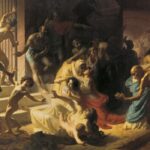Christians are indistinguishable from other men either by nationality, language, or customs. They do not inhabit separate cities of their own, or speak a strange dialect, or follow some outlandish way of life.
That is from the Letter to Diognetus, written around 130–180 AD. It is one of the earliest apologias (defenses) of Christianity at a time when Christians were a very small minority in the Empire. The author wrote that the Christians’ manner of dress, food, and way of life in general followed the custom of whatever city in which they lived. And yet he noticed something extraordinary about them:
They live in their own countries as though they were only passing through. They play their full role as citizens, but labor under all the disabilities of aliens. Any country can be their homeland, but for them their homeland, wherever it may be, is a foreign country. Like others, they marry and have children, but they do not expose them. They share their meals, but not their wives. They live in the flesh, but they are not governed by the desires of the flesh. They pass their days upon earth, but they are citizens of heaven. Obedient to the laws, they yet live on a level that transcends the law.
This letter, rediscovered on the back of some parchment in the 1300s, speaks of love and hate:
Christians love all men, but all men persecute them. Condemned because they are not understood, they are put to death, but raised to life again. They live in poverty, but enrich many; they are totally destitute, but possess an abundance of everything. They suffer dishonor, but that is their glory. They are defamed, but vindicated . . . yet no one can explain the reason for this hatred.
Why did people all over the ancient Roman Empire hate Christians? Were Christians looting, raping, and pillaging? No. Were they starting wars and forcing conquered enemies to convert? No. Then why the hatred?
Before we get our answer, let us review the first Church catechism, known as The Teaching of the Twelve Apostles, written around 70–100 AD. It stated: “Commit no murder, adultery, sodomy, fornication, or theft. Practice no magic, sorcery, abortion, or infanticide.”
Now, why were those things listed in the Church’s first catechism? And why did Christianity prohibit those things? They were included because the pagan world was awash in them. They were a normal part of life.
Behold, I make all things new.
That is what the One seated on His throne says at the end of the Bible.
What gets lost today is that when Christ came, He did indeed make all things new. He changed everything. How could things not have changed? God, the author of life, lowered Himself and took on a human body. That brought on a radically different way of looking at things, including the human body.
“Do you not know that your bodies are members of Christ Himself?” St. Paul asked the free-loving Corinthians. And so, an historian asked, how could any man, knowing his limbs were consecrated to the Lord, think to entwine them with those of a prostitute?
And the prostitute, the bar girls and the painted boys in brothels, the sex slaves used without a second thought by their masters. What about them? Were they not given hope? Knowing their bodies were not just play things but temples of the Holy Spirit, they were given a glimpse of salvation. To suffer as Christ had done, to be beaten, degraded, and abused, was to share in His glory. (cf. Tom Holland, Dominion)
Another radical change, something totally new, was this: When the Word became flesh, He did not drop out of the sky like a mythical Greek or Roman God. He came as a helpless baby. You see, in the ancient pagan world, smaller, weaker, younger things were of much lesser value than larger, more powerful things. The larger and powerful were free to prey on the small and weak. Again, that was the normal course of events. Just as the hawk preys on the dove, and the robin on the worm, it was natural.
Scholars note how the dynamic in the Roman world was not between men and women as it is now. It was between those who have power, namely Roman free male citizens, and those who were subordinate to them. A Roman man had the right to sexually use anyone who was subordinate to him, such as slaves and any and all social inferiors. There was no “Me Too” movement in the ancient world. The very idea would have been laughable.
And of course they laughed at Christ and laughed at His followers who claimed that every human being is made in the image of God. That meant the least of our brethren were not only to be protected, but reverenced. It meant that the small and weak actually became valuable members of the Body of Christ—even, incredibly, placed above the strong and healthy. Talk about turning the world on its head!
Like others, they marry and have children, but they do not expose them.
In the ancient world if a newborn did not appear to be up to the parents’ standards, and no one else wanted him, they left him to die by exposing him to the elements. So, when abortion advocates today yell into the microphone, or lecture a class of college freshmen, “Every child a wanted child!” there is nothing new in their thinking. It’s not progressive; it is regressive. They are merely spouting recycled old paganism where the larger and powerful dominate the weak.
I give you a new commandment: love one another. As I have loved you, so you also should love one another.
Christ introduced a new kind of thinking, a new kind of love; not just a natural one, but a supernatural love. And He was hated for that, so they hung Him on a cross. The powers of this world hung someone they thought was weaker than them. Yet the One they hung was Almighty God, the One who sits on His throne and says, “I make all things new.”
There is a line in the 2004 movie, The Passion of the Christ, when Christ falls and the heavy cross lands on top of Him. His Mother busts threw the crowd and kneels down beside Him. Strengthened by the Virgin’s presence, Christ gets up, puts the cross back on His shoulder, puts His bloodied hand on her cheek, and says, “Behold, I make all things new.” Then He continues on His way to Calvary.
My friends, something new happens at Holy Mass. Through the death and resurrection of Christ, a new heaven and a new earth appear, and the former earth begins passing away. That is why we live in our country as though we are only passing through. That is why, as we continue on our way, any country on earth can be our homeland. Because for us Christians, our homeland—wherever it may be—is a foreign country.
Image from Wikimedia Commons

















